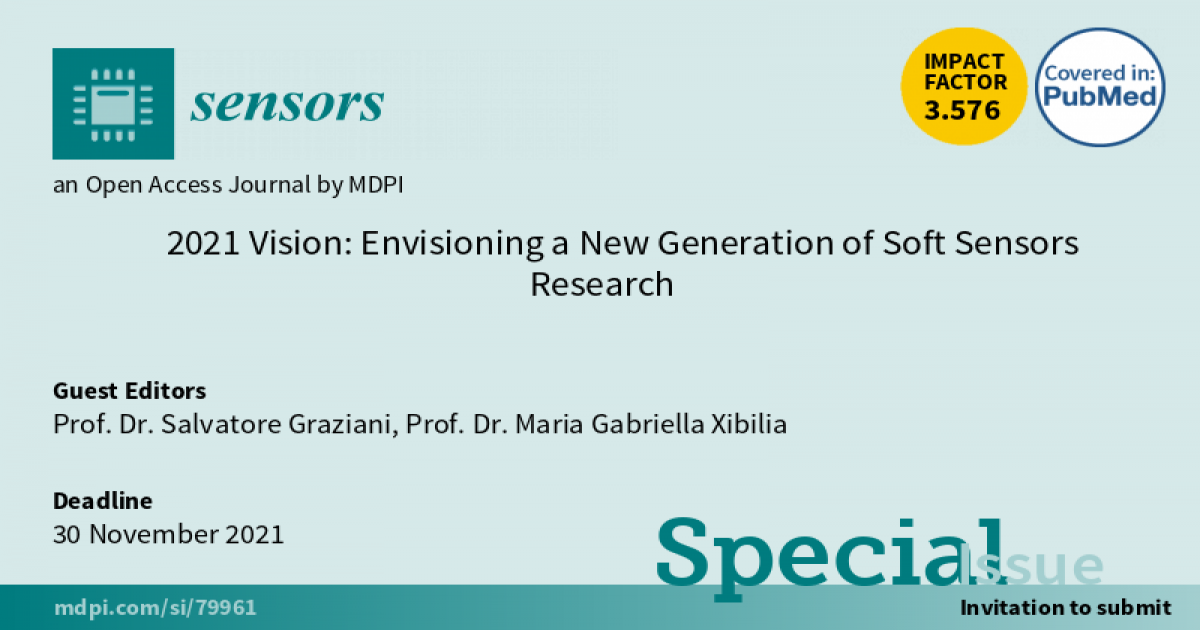2021 Vision: Envisioning a New Generation of Soft Sensors Research
A special issue of Sensors (ISSN 1424-8220). This special issue belongs to the section "Intelligent Sensors".
Deadline for manuscript submissions: closed (30 November 2022) | Viewed by 1123

Special Issue Editors
Interests: artificial intelligence; neural networks; soft sensors; ionic polymeric transducers; sensor modelling and characterization; mechanical sensors; energy harvesting; smart materials; smart sensing systems
Special Issues, Collections and Topics in MDPI journals
Interests: automatic control; system identification; nonlinear control; industrial automation; soft sensors; soft computing; machine learning
Special Issues, Collections and Topics in MDPI journals
Special Issue Information
Dear Colleagues,
Soft Sensors are among the hottest topics in industrial research field. As a result, the number of proposed design methods is growing at an impressive rate. Nevertheless, one hand some relevant theoretical issues, concerning the Soft Sensor, need a deeper attention, on the other hand, applications in fields other than industries have been seldom proposed. A better exploitation of Soft sensors makes it mandatory approaching theoretical problems such as model interpretability, soft sensors for time varying systems, soft sensors model performance assessment and maintenance.
The full acceptance of Soft Sensor from a wider community can pave the road to their application in seldom-explored fields, such as precise agriculture, smart houses, cities, and IoT, where they can contribute to the implementation of sustainable development. Soft Sensors can contribute to a more efficient exploitation of data and therefore, to better performing monitoring and control policies implementation. A beneficial effect can be produce on the using of resources and energy.
This special issue aims at collecting a blend of theoretical and applicative contribution on the topics mentioned above, which enlightens the path towards next-generation Soft Sensors.
Prof. Dr. Salvatore Graziani
Prof. Dr. Maria Gabriella Xibilia
Guest Editors
Manuscript Submission Information
Manuscripts should be submitted online at www.mdpi.com by registering and logging in to this website. Once you are registered, click here to go to the submission form. Manuscripts can be submitted until the deadline. All submissions that pass pre-check are peer-reviewed. Accepted papers will be published continuously in the journal (as soon as accepted) and will be listed together on the special issue website. Research articles, review articles as well as short communications are invited. For planned papers, a title and short abstract (about 100 words) can be sent to the Editorial Office for announcement on this website.
Submitted manuscripts should not have been published previously, nor be under consideration for publication elsewhere (except conference proceedings papers). All manuscripts are thoroughly refereed through a single-blind peer-review process. A guide for authors and other relevant information for submission of manuscripts is available on the Instructions for Authors page. Sensors is an international peer-reviewed open access semimonthly journal published by MDPI.
Please visit the Instructions for Authors page before submitting a manuscript. The Article Processing Charge (APC) for publication in this open access journal is 2600 CHF (Swiss Francs). Submitted papers should be well formatted and use good English. Authors may use MDPI's English editing service prior to publication or during author revisions.
Keywords
- Soft Sensors
- Soft Sensors for time variant systems
- Model Interpretability
- Soft Sensor maintenance
- Soft Sensor performance estimation
- Emergent applications of Soft Sensors
- Soft Sensors for IoT
- Soft Sensors for precise agriculture
- Soft Sensors for the environment
- Soft Sensors for sustainable development
Benefits of Publishing in a Special Issue
- Ease of navigation: Grouping papers by topic helps scholars navigate broad scope journals more efficiently.
- Greater discoverability: Special Issues support the reach and impact of scientific research. Articles in Special Issues are more discoverable and cited more frequently.
- Expansion of research network: Special Issues facilitate connections among authors, fostering scientific collaborations.
- External promotion: Articles in Special Issues are often promoted through the journal's social media, increasing their visibility.
- Reprint: MDPI Books provides the opportunity to republish successful Special Issues in book format, both online and in print.
Further information on MDPI's Special Issue policies can be found here.







